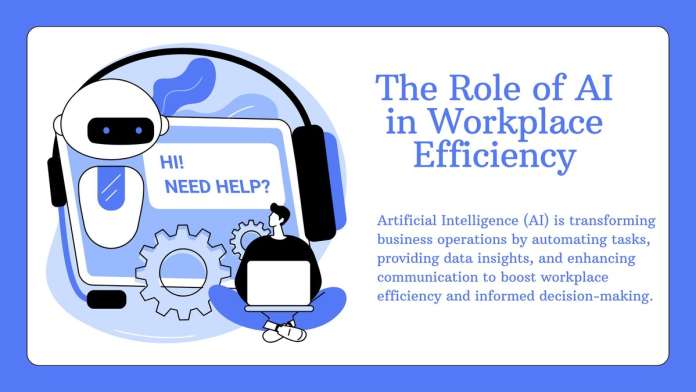Artificial Intelligence (AI) is revolutionizing how businesses operate, driving significant improvements in workplace efficiency. By automating repetitive tasks, providing data-driven insights, and enhancing communication, AI helps organizations streamline operations and maximize productivity. Integrating AI into everyday workflows ensures that businesses not only save time and resources but also make more informed decisions.
Transforming AI in Workplace Efficiency
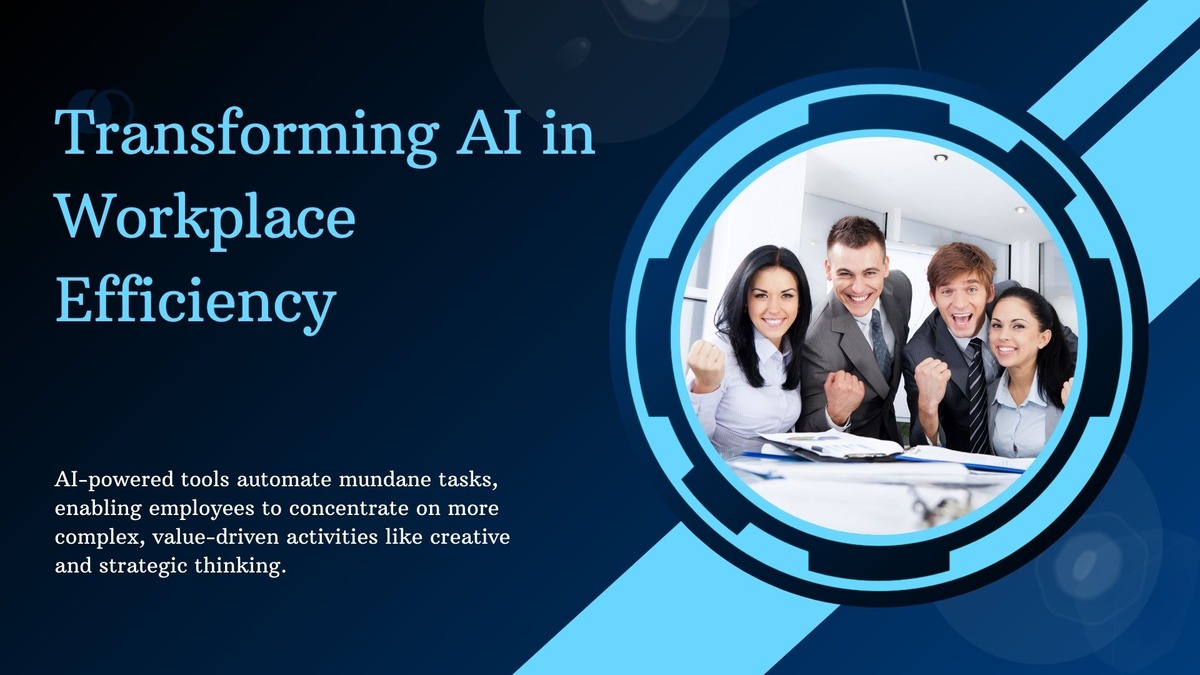
In today’s competitive environment, effective time management is crucial. AI-powered tools can take over mundane tasks, allowing employees to focus on more complex and value-driven activities. For instance, automated scheduling systems, AI-driven customer service bots, and intelligent data sorting software can handle routine jobs more quickly than human employees, freeing them up for creative and strategic thinking.
Moreover, AI enhances decision-making by analyzing large datasets to provide actionable insights. This capability helps managers pinpoint inefficiencies, forecast trends, and make data-backed choices that drive the business forward. By supporting more accurate and timely decisions, AI ensures that companies stay agile and responsive to market shifts.
In terms of communication and collaboration, AI-powered platforms facilitate smoother interactions within teams and across departments. Tools like natural language processing and machine learning algorithms can dissect extensive data, making internal communication clearer and more effective.
In conclusion, AI stands as a game-changer for workplace efficiency, enabling businesses to operate smarter and faster. While the initial investment in AI technology might seem substantial, the long-term benefits include enhanced productivity, better decision-making, and improved employee satisfaction. As AI continues to evolve, its role in enhancing workplace efficiency will only become more significant.
Streamlining Routine Tasks with AI
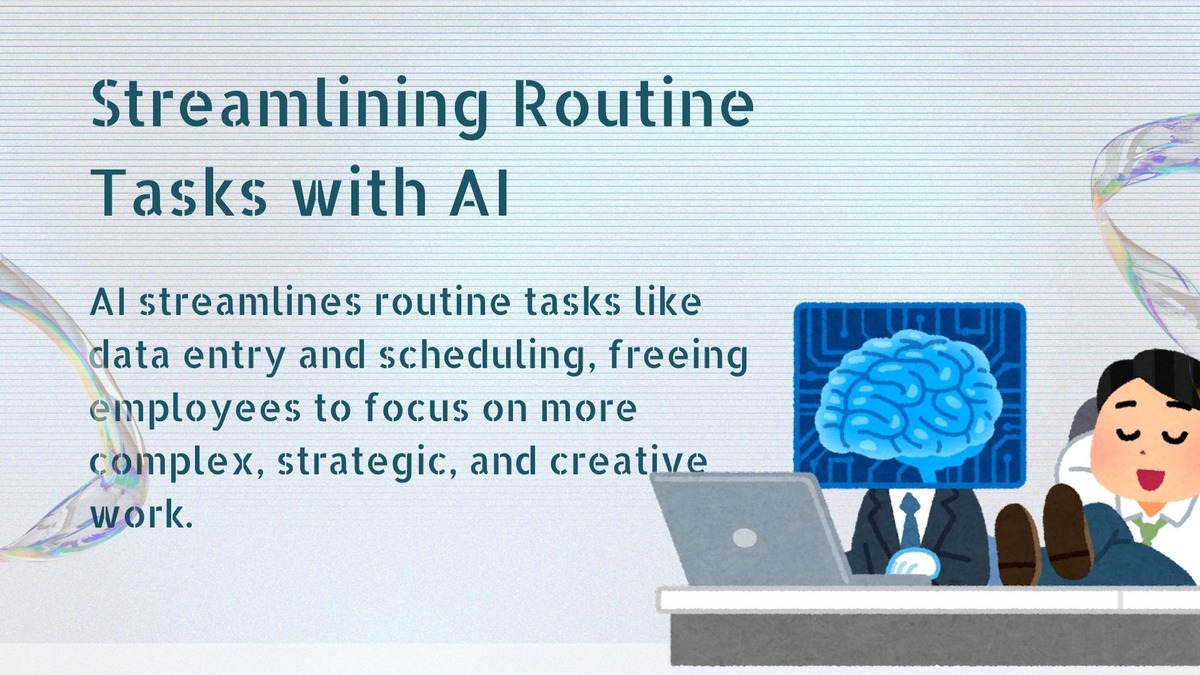
Incorporating AI into the workplace can significantly streamline routine tasks, allowing employees to focus on more complex and creative endeavors. From automating data entry to managing emails, AI tools help eliminate repetitive tasks that often consume substantial amounts of time. For instance, AI-powered bots can handle customer service queries or manage appointment scheduling, enabling human workers to dedicate their skills to more strategic activities.
-
Enhancing Document Management
One standout example is the use of AI in document management. Traditional methods of sorting and organizing documents are time-consuming and prone to human error. AI algorithms can quickly index and categorize documents, making it easier for employees to retrieve important information when needed. This not only saves time but also enhances accuracy, reducing the likelihood of costly mistakes.
-
Financial Efficiency:
Financial departments also benefit immensely from AI. Tools equipped with AI can automate invoice processing, payroll management, and financial reporting. This reduces the administrative burden on employees and ensures that financial tasks are completed promptly and accurately. For businesses, this translates to fewer errors, improved compliance, and better financial health.
-
Optimizing Workflows:
Moreover, AI can assist in managing workflows by prioritizing tasks based on urgency and importance. AI-driven task managers analyze workload patterns and employee performance to ensure that high-priority tasks are addressed first. This leads to better time management and increases overall productivity.
In summary, AI’s ability to streamline routine tasks frees up valuable human resources. Employees can focus on more critical aspects of their roles, leading to a more efficient and productive workplace. By reducing the time spent on mundane tasks, companies can foster innovation and accelerate their growth.
Enhancing Decision-Making and Analytics
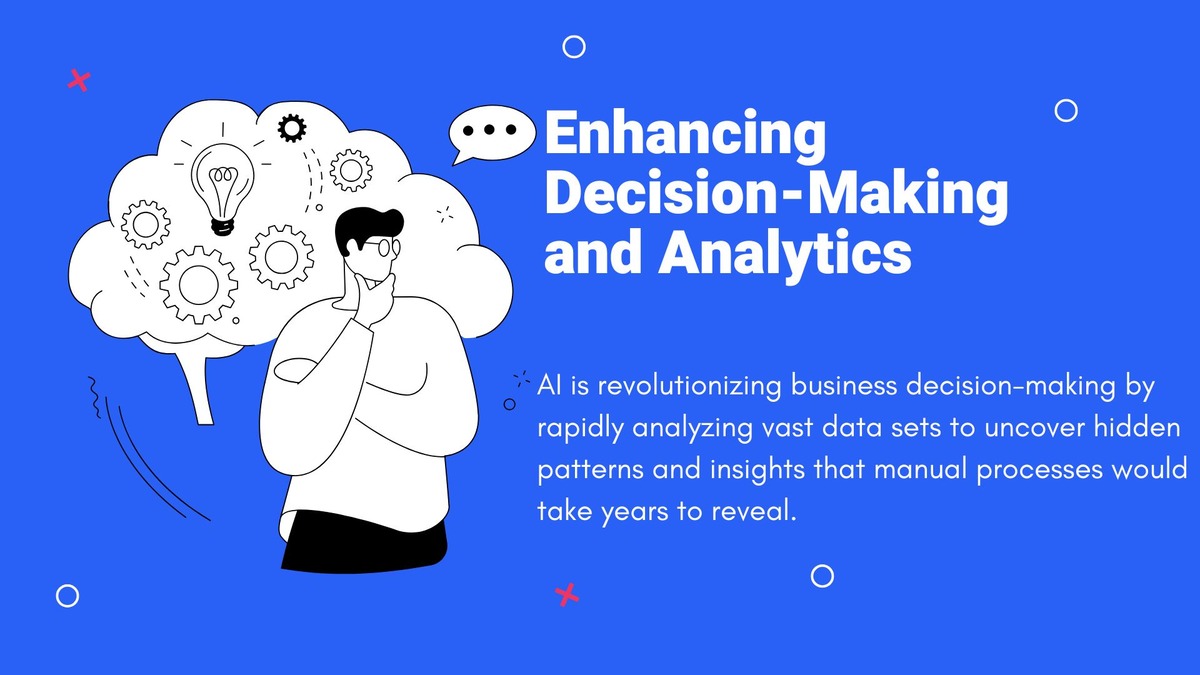
Artificial Intelligence (AI) is transforming how businesses make decisions and analyze data. By leveraging AI, companies can quickly unlock valuable insights from massive data sets that would take humans months, if not years, to process manually. AI algorithms can sift through data to identify patterns, trends, and anomalies that are often hidden from human eyes.
-
Advancing Accuracy with Machine Learning:
Machine learning, a subset of AI, allows these systems to become smarter over time. As they are exposed to more data, they improve their accuracy, making predictive analytics more reliable. For example, in a marketing department, AI can analyze customer behavior data to predict future buying patterns, enabling more strategic decision-making and targeted marketing campaigns. This means not only can businesses react to current trends, but they can also anticipate future ones, giving them a competitive edge.
-
Enhancing Decision-Making with NLP:
AI further enhances decision-making through advanced analytics. Natural Language Processing (NLP) can be used to understand and interpret human language from sources like social media and customer reviews. This provides companies with deeper insights into customer sentiment and needs, facilitating more informed business decisions.
-
Real-Time Insights with BI Tools:
Moreover, AI integration in Business Intelligence (BI) tools can streamline reporting, providing real-time dashboards that display key performance metrics. This allows managers and executives to make instant, data-driven decisions without waiting for manual reports.
Overall, AI acts as an invaluable assistant in the decision-making process, reducing human error, speeding up data processing, and enabling more strategic and informed business actions. By doing so, it maximizes efficiency, optimizes resource allocation, and ultimately drives business growth.
AI-Powered Communication and Collaboration Tools
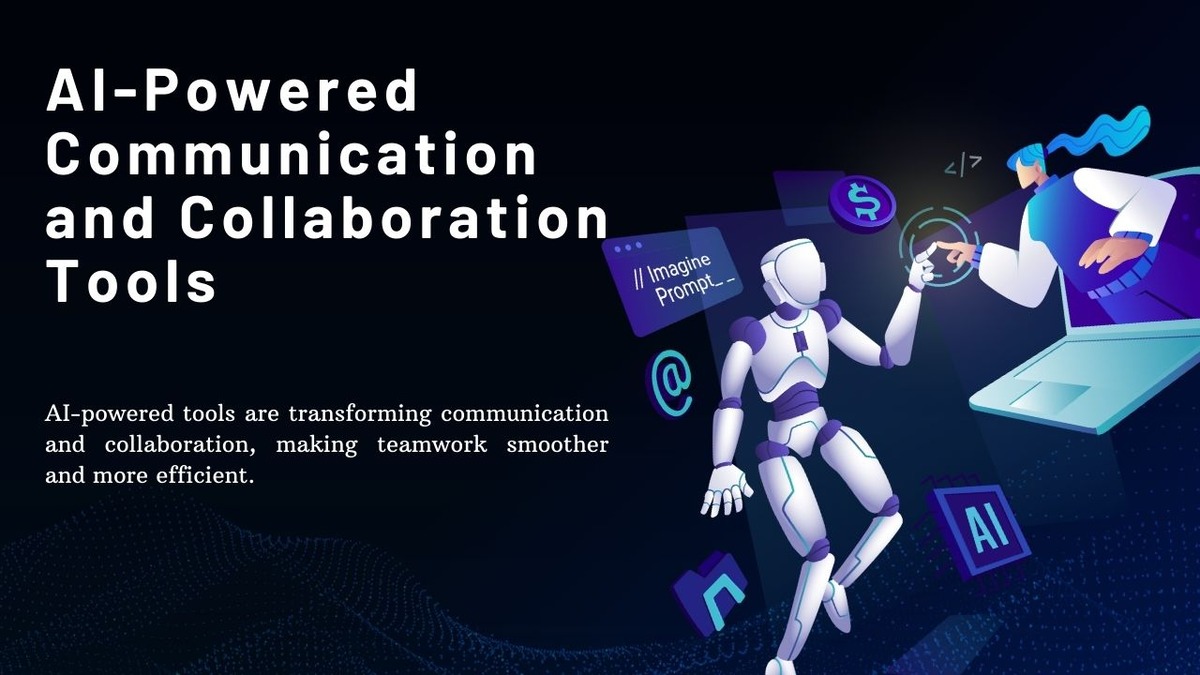
In today’s fast-paced business environment, seamless communication and collaboration are essential for success. AI-powered tools are revolutionizing how teams interact and work together, making the process smoother and more efficient.
-
Streamlining Email Prioritization with AI
One of the significant advantages of these AI tools is their ability to manage and filter information. For instance, AI-driven email assistants can prioritize messages based on their importance, ensuring that urgent emails get immediate attention while less critical ones are addressed later. This reduces the time employees spend sifting through their inboxes.
-
Enhancing Virtual Meetings with AI:
Additionally, AI can enhance virtual meetings, which have become commonplace. Intelligent scheduling assistants can find optimal meeting times by analyzing participants’ calendars and suggest slots that work for everyone. During the meetings, AI can provide real-time transcription and translation services, making communication easier for global teams. Post-meeting, these tools can generate summaries, highlighting key points and action items, ensuring that nothing is overlooked.
-
Optimizing Collaboration with AI Insights
Collaboration platforms integrated with AI can also recommend relevant documents and resources based on the context of discussions, saving time spent searching for information. Moreover, predictive analytics can anticipate project bottlenecks and suggest proactive measures to keep the workflow uninterrupted.
-
AI-Driven Team Collaboration:
By leveraging AI in communication and collaboration, companies can break down silos, enhance teamwork, and significantly boost overall productivity. This integration leads to faster decision-making, improved resource allocation, and a more connected workforce. Embracing AI in this domain isn’t just a trend; it’s a strategic move towards a more efficient and dynamic working environment.
Real-Time Feedback and Task Management
In the fast-paced work environment, real-time feedback and efficient task management can make all the difference in maintaining productivity. AI technologies are revolutionizing how companies handle these aspects, offering immediate insights and streamlining project workflows to enhance performance.
-
Task Management:
One of the key benefits of AI in task management is its ability to provide instant updates and feedback. With AI-driven tools, managers can receive real-time reports on project status, team performance, and individual contributions. This immediacy allows for quicker adjustments and ensures that deadlines are met without unnecessary delays.
-
Task Prioritization and Collaboration:
AI tools also excel in prioritizing tasks based on urgency and importance. Automated systems can analyze the workload and allocate resources effectively, ensuring that critical tasks receive attention first. This not only boosts productivity but also reduces the stress associated with manual task prioritization.
-
Boosting Team Performance:
Moreover, AI-driven platforms facilitate better communication among team members. Tools that offer real-time collaboration features, like shared dashboards and instant messaging, help everyone stay on the same page. This level of connectivity is especially beneficial for remote teams, enabling them to work seamlessly despite physical distances.
-
Real-Time Feedback for Employee Growth:
Real-time feedback mechanisms integrated into AI systems are equally advantageous for employee development. Continuous feedback helps employees understand their performance better and make necessary improvements promptly. It encourages a culture of constant learning and development, which is crucial for long-term success.
-
Maximizing Efficiency with AI:
While implementing AI in task management may come with its challenges, the benefits far outweigh the obstacles. By leveraging AI for real-time feedback and management, companies can create a more efficient, responsive, and collaborative work environment that drives success.
Addressing Challenges in AI Implementation
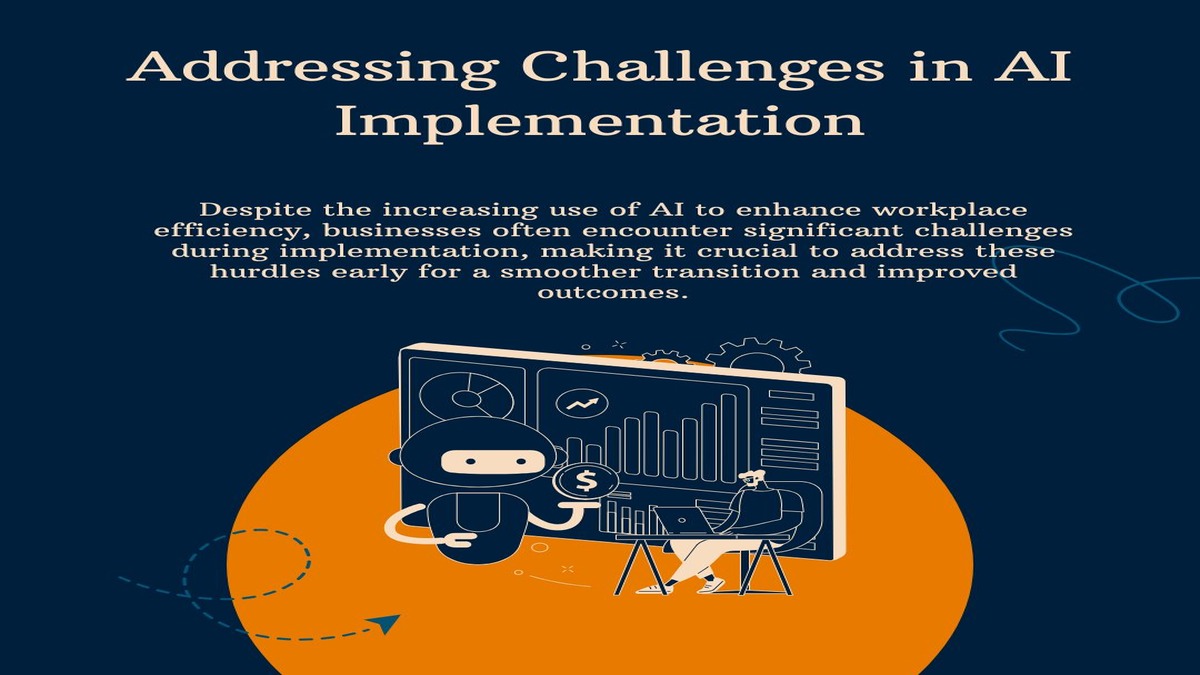
Despite the growing adoption of AI in streamlining workplace efficiency, businesses often face significant challenges during its implementation. Understanding and addressing these hurdles early on can pave the way for a smoother transition and better results.
-
Importance of Data Quality:
First, the issue of data quality cannot be overstressed. AI systems rely heavily on large datasets to function effectively. Inaccurate or incomplete data can lead to poor decision-making and even operational errors. Ensuring data integrity involves a meticulous process of cleaning and validating datasets, which can be time-consuming but is crucial for reliable AI performance.
-
Overcoming the AI Expertise Shortage:
Another significant challenge is the lack of expertise. Implementing AI solutions requires specialized knowledge, something many companies may not have in-house. Investing in proper training or hiring experts can be costly but is necessary to maximize the potential benefits of AI. Collaborating with AI vendor partners can also help fill this gap without overburdening internal resources.
-
Challenges of Integrating AI :
Moreover, integration with existing systems is often easier said than done. Legacy systems can be particularly resistant to integration, requiring additional time and financial resources to update or replace. Thorough planning and testing are essential to ensure compatibility and functionality.
-
Overcoming Employee Resistance:
Employee resistance can also be a stumbling block. Many workers worry that AI will replace their jobs, creating an atmosphere of distrust and reluctance to adopt new tools. Transparent communication about how AI will augment rather than replace human roles can help alleviate these concerns and encourage a cooperative environment.
-
Ethical and Compliance Challenges in AI
Lastly, ethical considerations and compliance issues must be addressed. As AI technologies continue to evolve, staying in line with legal and ethical standards is paramount. Regular audits and ethical guidelines should be in place to ensure that AI uses data responsibly and mitigates risks related to privacy and bias.Navigating these challenges effectively can set the stage for successful AI implementation, leading to significant improvements in workplace efficiency.
Read More: Top 10 Popular SaaS Marketing Blogs in 2024

